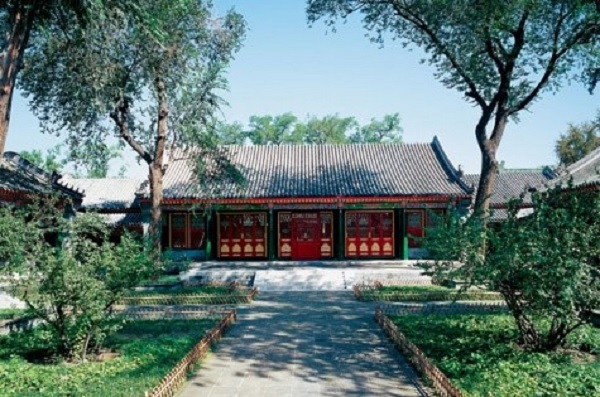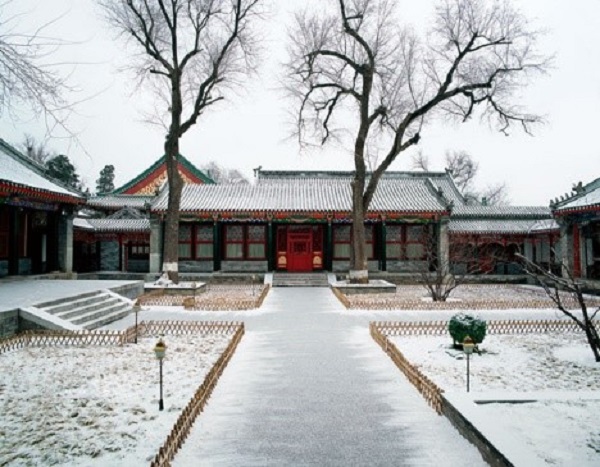

A view of the Baoguang Hall
The Baoguang Hall is located on the west road of Prince Kung's Palace. It was used by both Heshen (1750-1799), a top official and favorite during the Qianlong reign (1736-1795), and Prince Yonglin (1766-1820), the 17th son of Emperor Qianlong and younger brother of Emperor Jiaqing (r. 1796-1820), as a place to meet with guests. Later, the hall became a private parlor for Prince Kung after Emperor Xianfeng (r. 1851-1861) awarded the mansion to him in 1851.
The plaque of the Baoguang Hall was written by Emperor Xianfeng when he conducted an inspection tour there. "Baoguang" comes from a classical Chinese article, entitled "On Leveling All Things", composed by Chinese philosopher Zhuangzi of the Eastern Zhou Dynasty (770-256 BC). Emperor Xianfeng wrote it in the hope that Prince Kung would keep a low profile. Accordingly, Prince Kung wrote a special article to show that he had fully understood what Emperor Xianfeng wished him to be.

A snowy view of the Baoguang Chamber
On May 30, 1898, one day after Prince Kung's death, Emperor Guangxu (r. 1875-1908), Empress Dowager Cixi (1835-1908) and their senior officials worked all day in the Baoguang Hall, where they also decided on all details and requirements for the funeral of Prince Kung.
For instance, Emperor Guangxu was expected to suspend court meetings with his officials for seven days and to dress in ordinary clothes for 15 days. Moreover, Prince Kung was posthumously awarded the posthumous title of "Loyalty" or "Zhong" in Chinese and was formally inducted into the Royal Memorial Hall of Virtuous and Competent Officials on May 31, 1898. He was ranked after Prince Yunxiang (1686-1730), the 13th son of Emperor Kangxi (r. 1662-1722) and a close aide to Emperor Yongzheng (r. 1723-1735), among all people in the hall, receiving the highest royal honor between the reigns of Emperor Xianfeng to the end of the Qing Dynasty (1644-1911).
Fuwei (1880-1936), the oldest grandson of Prince Kung, was allowed to inherit his royal title on the same day.
The ceilings and beam paintings of the Baoguang Hall are mainly characterized by flowers and grasses plus patterns of clouds, which jointly create a harmonious and tranquil atmosphere. The paintings of lotus, chrysanthemum, and peach flowers are symbolic of auspiciousness, longevity, and the blessing of more children.